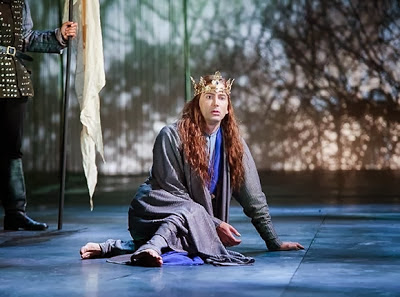To clap, or not to clap? That was the question posed by a triumphant David Tennant as he bowed deeply after this landmark broadcasting of Richard II into cinemas around the world. Some of my companions sitting in Grantham did, but then came the hush, as confusion reigned over the appropriate response. I see on the Internet that the same question hung over audiences in packed cinemas around the country.
I did clap, for quite a long time - involuntarily as it
happens, as this daring event by the RSC deserved something more than mumbling
approbations and shuffling feet. I mean, what a gloriously brass-necked thing
for the Company to undertake - and what nerves shown by the cast, who could -
really could - have cocked up the odd line, scene or indeed the whole event.
That's the drama of live drama - and there's nothing quite like witnessing the
vulnerable high wire acts required of Shakespeare in the flesh.
Richard II is a fine play about the assumption of power - in
the sense of taking-it-for-granted - and the assumption of power in the sense
of snatching it from one who already has it. Richard had been King of England
since the age of ten, and Tennant's Richard is quite used to the trappings of
wealth and favour, wafting from court to court with a snobbish disdain of mere
terrestrial squabbles. This graceful arrogance hides the not inconsiderable
qualities of the man, who is flawed and petulant - yes - but cultured and
genuinely patriotic. Richard has an unshakable conviction in the divine right
of kings to rule. However, ruling on a dispute between the macho Henry
Bolingbroke and his rival Hereford, Richard oversteps himself when he banishes
both from his domain. Bolingbroke's father, the old hero, John of Gaunt, pleads
for his son, but Richard, in a flash of regal pique, merely extends his son's
ban by a year.
Through this act, Richard alienates powerful courtiers, who
sympathise with Bolingbroke, and support
his regrouping and return to England. Nigel Lindsay's Bolingbroke is a
swaggering, brutish alpha male, who shows no real sympathy for the floundering
King. Director Gregory Doran highlights Richard's bemusement and
incomprehension as Bolingbroke's strength become irresistible. I felt genuinely
sorry for Richard, as he drifted, rudderless, from crisis to crisis, resulting
in a heartbreaking goodbye to his queen, played skilfully by Emma Hamilton.
This is a seriously heavyweight cast, and the performances
were all characterised by depth and intelligence. Michael Pennington's John of
Gaunt as a depressed shadow of his former self, was edgy and uneasy, especially
in his "this scepter'd Isle" speech, which is widely misrepresented
as a triumphalist rabble rouser, rather than a sad lament for a broken country.
Jane Lapotaire as the Duchess of Gloucester is perhaps the story of the
production, having not acted for years after a brain haemorrhage. Her one and
only speech, right at the beginning, exposes the rotten roots of Richard's
reign. The inclusion of this harsh soliloquy is an act of bravura by Shakespeare.
Its delivery, by Jane Lapotaire, is an act of grace, courage and personal
redemption.
From these stark, dank beginnings the play grows and
engages, and during the second half, one is lost in the pain and bewilderment
of a King who knows nothing but being King. His death comes as something of a
relief for him, and leaves us facing another - arguably less able - man in his
throne. At the end, the shadow of Richard hangs over him; as it has done all
morning over me. I can't wait to see how Richard's nemesis, Bolingbroke - I
mean Henry IV - gets on in the next broadcasting event by the RSC. If it's
anything near as good as this, I will indeed clap at the end - and loudly.




